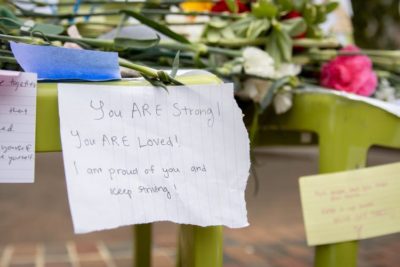
|
|
Community Action Agencies are vital, local, private and public nonprofit organizations that have been around since the 1964 Economic Opportunity Act. While their history is long, their mission of fighting poverty in low-income communities is as relevant as ever during the pandemic.
The NC Community Action Association (NCCAA) released a report in December with the Kenan Institute of Private Enterprise at UNC. The report recommends specific actions for community action agencies as they continue their efforts to eliminate poverty and generate self-sufficiency among low-wealth individuals and families, and work to create more inclusive and equitable communities throughout our state.
Listening to the voices of North Carolina’s people
The voices of people in North Carolina’s low-wealth communities drive the report and its recommendations:
“We’ve always had a hard time, but I think with the COVID hitting us when it did, that we found that everything doubled, all of the crises seemed to double. The food needs doubled. The need for heating and oil doubled and tripled. Unemployment — we don’t have a lot of employment in [this community], and so even what we had seemed to be diminished…”
While solid data is essential for any proposed policy changes, it’s the stories of those most directly impacted who can truly move the debate. The report bases its recommendations on how people have experienced the pandemic: job loss, extreme financial hardship, the loss of friends and loved ones to COVID-19, and the dramatic differences in how some communities have borne the weight of the pandemic, particularly women and Black families.
“It’s like that old saying that if the United States catches a cold, then the Black community catches pneumonia. And this pandemic has certainly taken its effect on the African-American community.
“And no offense to all the guys on this, but it’s [the pandemic] really been detrimental to women. The majority of the burden has been placed on not only the schooling, the childcare, the nutrition – it’s a lot. I’ve seen women cry just like, ‘I’m just so tired I don’t know what to do.’”
Lifting up the need for child care
One of the most pressing issues highlighted in the report is one that NCCAA, local agencies, and NC Child all have common interest: child care.
Among the key recommendations for community action agencies is a focus on growing the availability of child care in low-income communities:
“To overcome a major barrier to women’s ability to participate in the labor market generally, and especially during the pandemic, develop a small business technical and managerial assistance program to both encourage the development of new and strengthen existing childcare businesses in low income communities.
“Without a robust set of viable childcare enterprises, lack of access to childcare will continue to be a major barrier to women’s re-entry and full participation in the labor market, especially for unpartnered females with school-age children.”
The COVID-19 pandemic exposed deep problems within our child care system, but I have a lot of hope that it can lead to much-needed policy changes for early education. As the Head Start model has shown, investments in young children and their caregivers leads to great outcomes.
The NCCAA report underscores that investing in child care creates dramatic economic returns in the years to come.
Centering community voices in advocacy
NC Child is engaged on an advocacy journey — one that also aims to center community voices in policy changes that can undo poverty and create opportunity for more children. Community Action Agencies have been engaged in effective anti-poverty work for over 50 years, and they can serve as a model for so many of our efforts.
We believe strongly in the power of working with partners to move important changes that make people’s lives better. We applaud this report for putting the voices of impacted families at the forefront and will use it as a model for our own advocacy.





